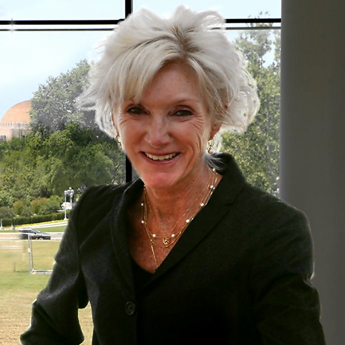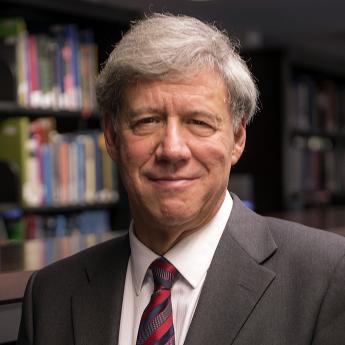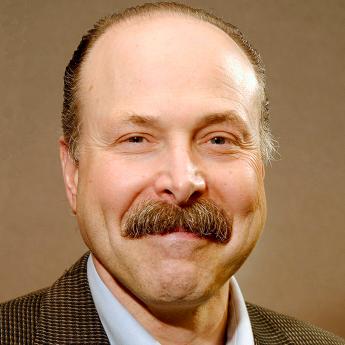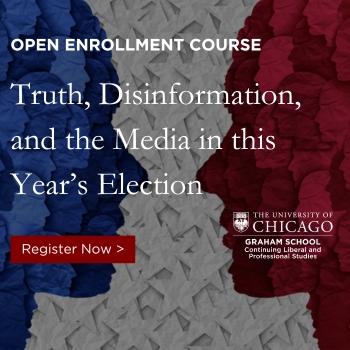Show Notes
If you want to better understand how Trump has forever changed the American presidency, the history of impeachment, or how to fix the dysfunction in our government, it’s best to go to an expert. Prof. William Howell is one of the leading scholars on presidential powers.
On this episode, Howell explains how Trump’s era fits into the larger narratives of the presidency, how the debate around impeachment compares to the past, and he argues why giving more powers to the office could actually make our government more effective.
Subscribe to Big Brains on Apple Podcasts, Stitcher and Spotify.
(Episode published June 17, 2019)
Recommended:
- Study shows power of imagery in improving perceptions of president
- Why public distrust could prove ‘corrosive’ to U.S. democracy
- Trump takes risk in pushing aside populism to occupy grand stage—The Hill
- Trump, Kim, and the War of Images—Pacific Standard
- Why teleprompter Trump comes off as “presidential”—Vox
Transcript
Paul Rand: It is arguably one of the most powerful offices on the planet.
Tape: Ask not what your country can do for you. Ask what you can do for your country.
Tape: Government is not the solution to our problem. Government is the problem.
Tape: America's possibilities are limitless for we possess all the qualities that this world without boundaries demands.
Tape: We the citizens of America are now joined.In a great national effort to rebuild our country and restore its promise for all of our people.
Paul Rand: The history of the presidency is one of change. Every four to eight years, someone new comes along and redefines what it means. But some things never change right?
William Howell: For a very long time we've looked to the presidency to embody and project our shared national heritage and interests. And I think that we have a president today who is challenging that notion.
Paul Rand: That's University of Chicago political scientist William Howell.He's one of the leading scholars on the power of the American presidency. Howell has a lot to say about how Trump has redefined the presidency and what his legacy could be. But he also thinks there are larger political conversations that are being overlooked.
William Howell: Trying to engage the public about those questions of longstanding interests is hard because as soon as you say I'm a political scientists and as soon as I say and I study the presidency it's instantly all about what’s happen right now.
Paul Rand: From the University of Chicago, this is Big Brains, a podcast about the stories behind the pivotal research and pioneering breakthroughs that are reshaping our world. On this episode William Howell and the power of the presidency. I'm your host Paul Rand.
Paul Rand: When you have one of the leading scholars in presidential power sitting across from you, it's tempting to not just dive right into the here and now. But Howell told me right off the bat that it's important to take a step back and understand how the office works broadly before understanding how the Trump presidency fits into that history.
William Howell: I started studying the American presidency as a graduate student in some ways by accident.
Paul Rand: And where did you go for graduate school?
William Howell: I went to Stanford. And I was casting about for an interesting topic and I had an interest in issues involving power. And it turns out much of the literature on the presidency at the time was fixated on the character of the president and all of the efforts of presidents to persuade and bargain with others. And I recognized this sort of basic fact which is that presidents often do things unilaterally. They just take action and then put the onus on Congress and the courts to offer a response. And when they fail to offer a response the president wins. Historically, they've been doing it with greater and greater frequency and greater and greater effect. And so this was a feature of the presidency and a presidential power that the literature didn't recognize. So, the first thought was hey there's an opportunity make a contribution here. The second piece was I had a longstanding interest in issues involving power and it was an opportunity to think about how power interacts with other kinds of power. How executive power interacts with legislative and judicial power and how outcomes are all in the end defined.
Paul Rand: One of Howell's major contributions to understanding the presidency is his book called “Relic”. At its heart is a very simple question, why is our government failing us? Is it political polarization, the increase in money in politics or do the seeds of our dysfunction go all the way to the Constitution? And could the solution come by actually giving the president even more power?
William Howell: This is a book that reflects upon the capacity of our government to solve problems and suggests that it doesn't do a particularly good job. There are lots of evaluative criteria might bring to bear when thinking about whether or not the government is performing well. And what we want to think about in particular is does it solve problems that the public recognizes as the legitimate subject of government action. And we say not so much. It doesn't so much, and it doesn't so much because by constitutional design we have a set of institutions that make it nearly impossible to craft policy solutions that are attentive to the long-term complex issues that are national in scope. We have a set of institutions that are set against one another and that puts Congress at the very front and center which tends to channel parochial short-term interests.
Paul Rand: A thrust so if I'm capturing this right it also was I think somewhat arguing that we ought to give our presidents more power.
William Howell: Yes. And in particular kind of way because whereas Congress channels short term local interests by design, by constitutional design, that's not a mistake—it's not that legislators have lost their way—they serve in the house every two years, six in the Senate, and they serve local districts in order to stay in office. They need to be constantly attentive to local needs, and today's local needs. Right. Okay. So the president is different in this regard. The president serves the nation as a whole, not perfectly, but more so than any other elected official represents the interests of the nation as a whole. And to the extent that legislators are “single minded seekers of re-election” as David Mayhew famously put it. There constantly thinking about the next election.
Paul Rand: You should a claim that one, that's a really good line.
William Howell: It is a good line. It's not mine, it’s been around for a while it's David Mayhew’s. Presidents cared deeply about their legacy. They're playing for the ages. They want to leave a mark that endures. And in that sense they're very different. They offer a very different kind of leadership than what comes out of Congress. And we need to leverage that in important ways.
Paul Rand: Relic was published in April, 2016. Later that year, Howell would have an experience that would shake up many of his views of the presidency, its legacy and how things may be changing…the election, of course, of Donald Trump.
William Howell: On election night in 2016, I was on the decision desk at ABC News. And so what the decision desk does is there are a group of kind of data analysts who are looking at past electoral returns, exit polls as they rolled in and precinct level vote returns as they roll in and try to make predictions about who is likely to win a particular race before all the votes have actually been counted. It became clear around ten at night how things were breaking.
Tape: It is now eleven thirty in the east you hear that chime, we have a projection. It is a big one, it is the state of Florida. Twenty nine electoral votes, they go to Donald Trump. Donald Trump has won the state of Florida one of his must win states right there. One of his keys to victory.
Paul Rand: When that happened, as a student of the presidency what thoughts started going through your mind. Either this is going to be fascinating, scary, terrifying, wonderful?
William Howell: For me, I experienced kind of a deep sense of dissonance because the work of the decision desk, and the work of network television on election night, is the work of prediction but I'll say the work of that evening was not where my head was primarily at. We've just had an unbelievably consequential election. It's going to have lots of consequences for our democracy which I think we're observing now and is going to shift our politics in really important ways. And those kinds of conversations were not a feature of that night. Frankly, they weren't a profound feature of the election more generally so much of which is built around this horse race coverage.
Paul Rand: You're studying historical perspectives on presidencies. And if we could think about how this president's likely to be remembered, and the chapters are not done being written yet, but if you had to stop today and say how's this guy going to be remembered. If you were studying him ten years out what would what would that look like.
William Howell: I want to answer in three parts, if I may. I won't linger too long on one. The first part is that there's some things about this president that are perfectly straightforward, which is that he's conservative and so he has pushed forward successfully tax cuts and he has pushed forward a deregulation agenda. And he has been an important part of appointing all kinds of conservative justices to the judiciary. And so that he's a Republican, and that he is conservative, has yielded a set of outcomes that are consequential and that's worth noting. Kind of like number one, point number two is that he is a populist. And, as a populist, he is pushing back in really important ways on our institutions and on our norms of how we interact with our elected officials. This has had all kinds of implications for areas ranging from diplomacy, international diplomacy, as other countries are trying to figure out what's going on in the United States, to Congress and the Republican Party, how are they to manage his interests in imposing tariffs on Mexico. Right. And building a wall on the southern border which they've shown no appetite for in the past, but suddenly they've hitched their fortunes to his wagon. And the third thing I'll say is that the jury's out. We can't know because a lot hinges upon who gets elected in 2020, what is to come of the Republican Party, are we to observe a course correction? Do we look back on this as a moment of kind of spasm. Where they're just freaking out. That this is a moment where people who felt ignored are finally having their say, but there will be an accommodation and a readjustment in the coming years or is this the beginning of an extended period where populist take hold and populist appeals become the norm. We don't know that yet, but a lot about Trump's legacy and reputation is going to hinge upon not just what he does but how others respond.
Paul Rand: So if we then look and say, is this a historical blip? And maybe the answer is we don't know. Is this a historical blip or is this going to change the dynamics of how it must be operating going forward. And what do you have a sense of that?
William Howell: Well, since serving on the decision desk in 2016, I've gotten out of the prediction business. So I don't know, but I will say that there is a very good chance that Trump gets re-elected. There are a set of fundamentals in place.
Paul Rand: I read something like, leading economists say it is highly likely he'll be re-elected.
William Howell: When the economy is performing this well and we're not waging unpopular wars abroad and his approval rating if anything has inched upwards such that it's now in the low 40s—that bodes well for him. He's not likely to face a meaningful challenge in the primaries. And meanwhile the Democrats have yet to find their tune. So it's perfectly probable that he gets reelected in 2020 and depending upon what happens there I think that's going to set in motion a whole set of things about the future of the Republican Party, what's to happen in terms of U.S. foreign relations, is it a blip—I think a lot rides on the outcome in 2020 election.
Paul Rand: It's possible that one of the most defining factors of Trump's presidential legacy will be the debate around impeachment. The history of impeachment and how Trump fits into it after the break.
Paul Rand: This conversation in many ways leads up to arguably a pressing question that seems like it gains a degree of attention every day. And this idea of impeachment, I wonder if we can look back and say where does the concept of impeachment come from. How was it written into our constitution? How is it playing out over the years? And what brings us to this door.
William Howell: I mean you've answered part of it in your question, which is to say it's embedded in the Constitution. It's a power that's recognized in Article 1 and it was seen at the time as a meaningful check on the presidency. Pressed to answer the question how often do you expect to see it used, they would have answered a lot more than we actually have. We've seen two successful impeachments. One hundred and thirty years apart in 1868 with Andrew Johnson and in 1998 with Bill Clinton.
Tape: History unfolding in the nation's capital today as a somber House of Representatives voted for only the second time in American history to impeach a president of the United States.
William Howell: Both of them failed to convict in the Senate. And I think, when trying to draw lessons from history via impeachment, a natural place to turn is Nixon's experience.
Tape: And in all of my years in public life, I have never obstructed justice.And I think too that I could say that in my years of public life that I welcome this kind of examination because people have got to know whether or not their president's a crook. Well I'm not a crook.
William Howell: And they're two important things to distinguish between then and now. One of which has to do with Fox. The first one is simply that we as a country we're not nearly as polarized then as we are now. The second thing is that Nixon didn't have in his corner a major media outlet that was backing him at every turn. And speaking exclusively to his base.
Tape: You can't say it any more clearly no collusion. So now the American people the answer is in on this if they want to do this on top of the Green Deal what are the political ramifications for not serving the American people and offering all kinds of reasons why we need to stick with him.
William Howell: So if what you're waiting for in order to move forward on impeachment is a shared reckoning, a shared recognition of the failures of this president, that's harder to do in an era in which you have a major cable news source squarely in the president's camp.
Tape: We've not found a new trove of compromising documents, there's no blurry iPhone video in which the president swears fealty to Vladimir Putin.
William Howell: One more note please. Which is that it's possible that the politics may shift over the course of impeachment hearings. If you look in the spring 1973, we're used to thinking about Watergate that the country came together and was completely against Nixon and there was this moment of reckoning that Democrats and Republicans alike shared in and a corrective was offered—not so much. In the spring of 1973, all of 19 percent of the American public thought Nixon should be removed from office. And that's when hearings are launched on the Watergate burglary. For the next year and a half, that number jumps up to eventually getting to as high as 58 percent. Two things to note. One is big changes in public opinion by virtue of holding these hearings and fixing the media's attention, and by extension the public's attention, on a set of crimes and misbehaviors committed by the president and those who serve him. Point number two is it got only up to 50 percent. It wasn't that overwhelming super majorities recognized that he needed to be removed, it got as high as 58 percent and then Nixon stepped down. And so it's possible that in holding hearings today that, not all members, but some members of the public may change and that some Republicans, five or 10 in the Senate, might shift their opinions. And if that's true then it starts to really take hold.
Paul Rand: Let's go back two and a half years when you still thought you could predict things. What's your prediction for how this whole thing shakes out. The impeachment issues…2020…
William Howell: Oh having just promised not to make predictions, you're coming back at me. What's going to happen. So here's what I think are the most likely scenarios. The Democrats don't move forward on impeachment, but that they continue to hold lots of hearings and that the field eventually winnows on the Democratic side and that the Democrat wins and whoever that might be wins in 2020 but that the challenges that Trump presents to our politics persist. I think this is an important piece which is that even if Trump doesn't get re-elected, and look it's basically a coin flip at this point, my guess is I give the slight edge to the Democrats in 2020, but that the Democrats would do well to attend to those deeper structural sources of anger and disaffection. And that requires institutional reform. It requires a lot of policy action. It requires them not simply arguing that they're going to present a return to normalcy. There needs to be a sense of urgency in their governance because even if we don't have Trump from 2022 to 2024 there's no reason why Trump 2.0 might not emerge then and that Trump could well be much more disciplined even more authoritarian than the Trump we've been living under the last two and half years.
Paul Rand: In any era, the debates around impeachment cut beyond just the sitting president. They're often wrapped up in the underlying political forces and structures that drive our politics. What those are, and how Howell thinks they need to change after the break.
Paul Rand: Howell says it's hard to be a political scientist in the age of Trump. There’re all sorts of conversations to be had about the structural issues and instability in our political system. But all anyone wants to talk about is Trump. So let's put the president aside for just a moment.
William Howell: So there are a lot of things that I'd like to talk about. Let me talk about one in particular which is a central theme of the book that I wrote in 2016, and we're writing a follow up to it which will be coming out next year. We meaning my co-author Terry Moe from Stanford and I. And that is to think about institutional reform in the service of effective government. To think about the ways in which we might change our governing institutions so that we stand a fighting chance of enacting policy that is coherent, that is relevant, that stands a chance of attending to the very real sources of dislocation and anxiety. Think about rising inequality between the rich and the poor, a warming climate, how do we attend to population movements from the global south to the global north in a very real and responsible way. To my mind, we don't have a set of institutions that are adequately equipped to address these kinds of issues. And it's hard to have conversations about institutional reform when you have a personality like Trump in office, and all the attention turns to him and his outsized personality. But you know, a hundred years ago there was a long term effort in this country under the progressive movement to think long and hard about institutional reform in the service of effective government. And that took the form of, in part, a more powerful presidency but also the introduction of the civil service reform and the rolling out of referenda. I don't want to suggest that these are the right reforms that we need today, but we, as a country, manage in fits and starts to have those hard conversations about how we should rework our politics not how do we preserve the institutional design of our founders but how do we rework that design in the service of the challenges that we face today.
Paul Rand: In his last book, “Relic”, Howell argued that in order to fix the dysfunction in our government we need to expand the power of the presidency. Given his reactions to our current president. Could that possibly still be the case?
Paul Rand: Oh yes. We address this issue head on in our new book. In “Relic”, we identified a particular kind of power that we wanted to give the president which had to do with increased agenda setting power to give the president the ability to introduce legislation within Congress and to force legislators within Congress to vote on the proposal. They're free to vote it down but they have to vote and if they don't it automatically becomes law. That's a serious power to give the president. But it's in the service of enlivening the legislative process. It's in the service of trying to force legislators to grapple with hard systemic problems in ways that they decidedly are not today. And it's not about increasing the president's unilateral powers or strengthening the hand of a demagogue. To my mind, there are some powers that the president already has that do have those effects and those should be curtailed. And we talk about this in the book. The president's ability to politicize primarily the Justice Department is deeply problematic. The president's pardon power is deeply problematic, and the president's unilateral powers are a mixed bag. On the one hand, they provide presidents opportunities to offer corrections and intervene in local challenges about how we should be implementing vague statutes enacted by Congress and that's important. On the one hand, there are all kinds of ways in which unilateral powers quite clearly can be abused. And so we need to think long and hard about it. So the argument here is not that presidents always deliver and that all that is good and great flows through the White House, decidedly not, but it is an effort to try to think about how we can best leverage the unique kinds of leadership that, in our politics today, flow from the White House. That attention to national interests, that attention to long term consequences of policy change. Where are you going to find leadership on something like climate change if not through the presidency. That's not to say that all presidents will provide that leadership, or that the kinds of solutions that they’ll offer will be effective solutions. But that's our best shot in our politics. And if what we're going to do is to shut down the White House for fear of another Trump coming into office is to miss the very reason why Trump got elected into office which is that we have a government that's failed to attend to lots of profound challenges that we as a country face.
Paul Rand: I’m going to give one final question let's look back from George Washington on, you have the power to bring back any one of our presidents to deal with the issues that we have today. Who would you choose and why?
William Howell: Gosh who do you choose and why. So the two obvious ones are FDR and Lincoln. Lincoln simply because he is, to my mind, and to most scholar’s mind, the greatest president that we've had. He preserved the union in ways that are attentive to the deep challenges of separation of powers. He's our most profound president. With FDR though what you get is a president who is perfectly willing to experiment, to try things out, to roll out initiatives in the service of jumpstarting change. For him, in response to the Great Depression. Can we combine the two of them?
Paul Rand: Sure.
William Howell: And have a president who is both attentive to issues of constitutional design and institutional design and who can assess the particular challenges of this moment and who also will act and act and act as FDR did. That's the kind of President that we need, albeit one that is monitored and checked and sometimes stopped in his, hopefully her, tracks by Congress and the court says as need be.
Paul Rand: Let's see if the next one matches up to this.
Episode List
The Urgent Need to Reinvest in American Research, with Barbara Snyder (Ep. 60)
AAU president discusses how more federal funding can secure American innovation
How Alternate Reality Games Are Changing The Real World with Patrick Jagoda and Kristen Schilt (Ep. 59)
UChicago scholars design ARGs to address issues ranging from climate change to public health
What Remains Unanswered After The 2020 Election, with William Howell and Luigi Zingales (Ep. 58)
UChicago economist and political scientist discuss the polls, what lies ahead for Biden and the country post-Trump
When Governments Share Their Secrets—And When They Don't, with Austin Carson (Ep. 57)
Scholar discusses the political theater of foreign policy—and the case for declassifying intelligence
How We Can Fix a Fractured Supreme Court, with Geoffrey Stone (Ep. 56)
Legal scholar examines how nomination of Amy Coney Barrett could tip an increasingly politicized bench
Correcting History: Native Americans Tell Their Own Stories (Ep. 55)
How scholars helped a Chicago museum rethink its representation of Indigenous peoples
The Future of Voting And The 2020 Election, with Assoc. Prof. Anthony Fowler (Ep. 54)
A leading political scholar discusses voting by mail, mobile voting and why he thinks it should be illegal not to vote.
Why The Quantum Internet Could Change Everything, with David Awschalom (Ep. 53)
A world-renowned scientist explores quantum technology and why the future of quantum may be in Chicago
The Way You Talk—And What It Says About You, with Prof. Katherine Kinzler (Ep. 52)
A leading psychologist explains how speech creates and deepens social biases
From LSD to Ecstasy, How Psychedelics Are Altering Therapy, with Prof. Harriet de Wit (Ep. 51)
A leading scientist explains the medical impacts of psychoactive drugs and the popularity of microdosing












